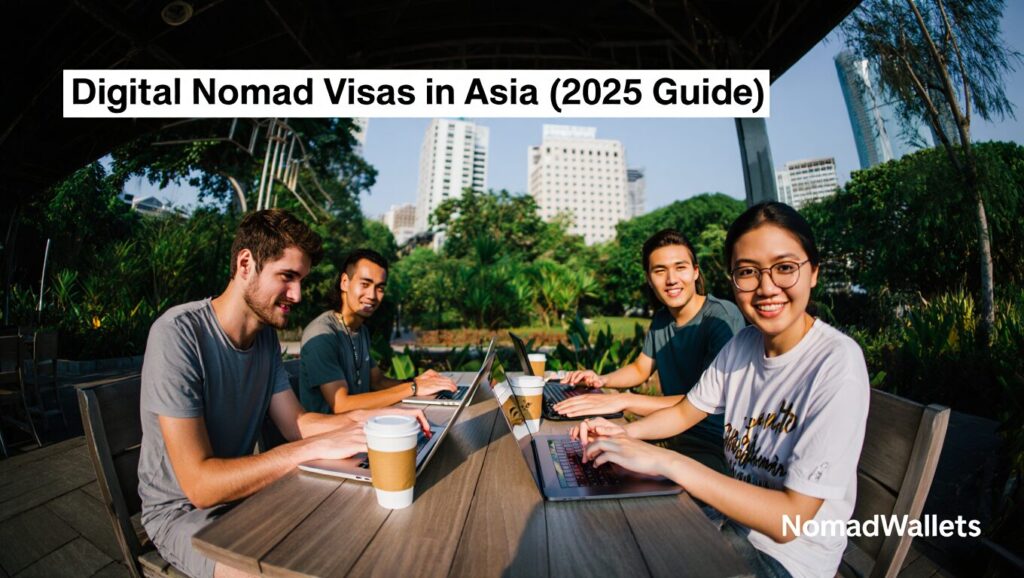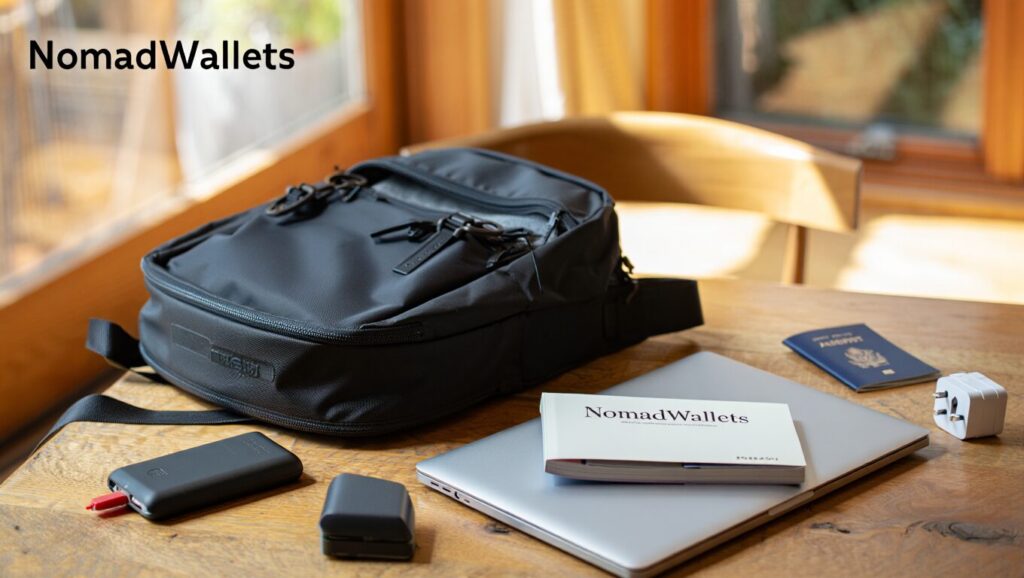
Introduction:-
Let’s be real — Asia has always had a certain pull for digital nomads. Maybe it’s the food, the affordability, the weather… or just the fact that you can get a full meal for under $3 and still find blazing-fast Wi-Fi. And now, with digital nomad visas in Asia 2025 becoming more accessible, it’s easier than ever to make the dream real.
But what’s changed in 2025? Well, a lot.
Governments across Asia are no longer just “tolerating” digital nomads — they’re actually welcoming us. New visa programs are popping up everywhere, designed specifically for remote workers who want to stay longer than a quick vacation.
And that’s what this guide is about:
If you’ve ever dreamt of calling Chiang Mai, Bali, or even Hanoi your home — not just for a week, but maybe for a whole year — this is where you start.
Let’s dive into which countries are offering what, and which one might fit your lifestyle best.

Top Asian Countries Offering Digital Nomad Visas
🇹🇭 Thailand – Long-Term Resident (LTR) Visa
Thailand’s LTR Visa is great… if you’ve got the income to back it up. You’ll need to show around $80,000+ annually, or meet specific company qualifications. In return, you could get up to 10 years of stay — which is massive.
📍Best for: High-earning remote employees or business owners who want a mix of beach, city, and mountains.
📝 Heads up: The paperwork can be intense, and most people go through visa agents.
🇮🇩 Indonesia – Second Home Visa / Bali Nomad Village
Indonesia has been toying with nomad-friendly ideas for a while. The Second Home Visa is official, but requires a $130K bank balance (ouch).
However, the Bali Nomad Village project in Ubud offers a more realistic community setup. If you’re a freelancer or digital creative, Bali is still one of the most popular (and doable) places to settle.
💡 Tip: Many nomads use the 180-day B211 visa as a workaround while longer options improve.
🇲🇾 Malaysia – DE Rantau Nomad Visa
Honestly? One of the best-balanced options in Asia right now.
The DE Rantau Visa lets you stay 12 months (with renewal options), requires proof of $2,000/month income, and supports a wide range of industries — from software to marketing.
Plus, Malaysia is developing official “nomad hubs” in Langkawi, Penang, and Kuala Lumpur with coworking spots, networking events, and fast Wi-Fi.
⚡ Pro: English-friendly, budget-friendly, and extremely nomad-aware.
🇻🇳 Vietnam – No Official Visa (Yet)
Still waiting on Vietnam to launch an official nomad visa, but in the meantime? People are making it work using:
- Tourist visas (usually 1–3 months)
- Business sponsorships
- Strategic (and legal) visa runs
Hanoi and Da Nang remain underrated gems for digital nomads — as long as you’re okay with a little visa gymnastics.
👀 Reality: Keep an eye out — Vietnam is rumored to be working on a remote work visa.
🇵🇭 Philippines – SRRV Visa
Yes, it’s called the Special Resident Retiree Visa, but don’t let that scare you.
If you’re over 35 and meet the income/deposit requirements, the SRRV gives you indefinite stay and the flexibility to live and work across the islands. It’s not specifically for nomads — but it works.
🏝️ Great if you want to base yourself somewhere warm, English-speaking, and island-heavy.

Visa Comparison Table – Quick Look
| Country | Visa Name | Income Requirement | Duration | Renewable? | Notes |
| Thailand | LTR Visa | $80,000/year | Up to 10 yrs | ✅ Yes | Best for high earners, complex paperwork |
| Indonesia | Second Home / B211A | $130,000 in bank (2nd Home) | 6–10 yrs / 6 months | ✅ / ❌ | Use B211A for short-term stays |
| Malaysia | DE Rantau | $2,000/month | 12 months | ✅ Yes | Great balance of cost + infrastructure |
| Vietnam | Tourist/Business | None officially | 1–3 months | ❓ Maybe | No official nomad visa yet, but many stay here |
| Philippines | SRRV | $10,000–$50,000 deposit | Indefinite | ✅ Yes | Not just for retirees — long-term friendly |
Tips for Applying for Digital Nomad Visas in Asia
Okay, let’s talk real for a second. Visa stuff can be a pain. It’s the least sexy part of the digital nomad lifestyle — and yet, it’s one of the most important.
So here’s what I (and pretty much everyone I’ve met in coworking spaces across Asia) have learned the hard way:

Start with your paperwork game strong.
Most nomad-friendly visas will ask you for the basics:
- A passport that isn’t about to expire (give yourself 6+ months minimum)
- Proof of income — usually bank statements or client contracts
- A clean background check (some ask for police clearance)
- Health insurance coverage (seriously, don’t skip this)
- A couple of passport photos — yeah, still a thing
Now, depending on the country, they might also want extras like a local sponsor, a letter of intent, or even a specific income in their currency. So… double check everything on the embassy’s site or immigration portal.
Should you use a visa agent?
Honestly? If you’re the kind of person who cries while filling out government forms (guilty), a visa agent might save your soul. In places like Thailand and Indonesia, they’re common — and usually worth it.
A few real-world tips:
- Apply early. Some visas take weeks (or months) to process — don’t wing it last-minute.
- Print backups. Even if everything’s digital, some border officers still want hard copies.
- Scan your documents and upload them to Google Drive in case you lose anything.
- Join local Facebook expat groups — they’re goldmines for up-to-date info, visa hacks, and which agents to trust (or avoid).
It’s not fun, but if you handle this part well, the rest of your nomad journey becomes way smoother.

Best Cities for Digital Nomads in Asia (2025 Edition)
Let’s be honest: not every city in Asia is made for remote work. Some are too loud. Some have sketchy Wi-Fi. Some are… just not the vibe.
But the places below? They’re tried-and-tested nomad favorites — the kind of cities that feel right when you open your laptop in a sunny café with decent espresso.
Chiang Mai, Thailand
It’s still the OG. Chill pace, amazing food, coworking spots on every corner, and a strong community of remote workers. Great for first-timers. And the cost of living? Still crazy low.
Bali, Indonesia (Ubud + Canggu)
A little spiritual, a little surfy — Bali attracts both wellness-focused creatives and laptop hustlers. Ubud is slower and surrounded by jungle, while Canggu has beach energy and a big digital nomad scene.
Kuala Lumpur & Penang, Malaysia
Modern, underrated, and super livable. KL has big-city energy with reliable infrastructure and great travel access. Penang, on the other hand, is slower, cheaper, and full of art, history, and yes — amazing food.
Da Nang & Hanoi, Vietnam
Da Nang has grown fast — beachside coworking? Yes please. Hanoi is more chaotic, more cultural — but also super cheap and surprisingly good for remote work (if you don’t mind a little noise).
Cebu or Siargao, Philippines
Want to wake up near palm trees and end the day with a sunset swim? The Philippines is underrated. English is widely spoken, people are warm, and you’ll feel like you’re on vacation even while working.

FAQs – Digital Nomad Visas in Asia
Q1. Can I work online in Thailand with a tourist visa?
Technically no. The tourist visa isn’t meant for work (even remote). But… many people still do it. The risk? You could be denied reentry or face a fine. If you’re staying long-term, go legal with an LTR or business visa.
Q3. Do I need to show tax returns?
In some countries, yes — especially for income verification. Others might just want a bank statement. Read the fine print or check embassy websites.
Q4. What happens if I overstay my visa?
Bad idea. You could get fined, blacklisted, or even detained. Set reminders, use apps like Nomad List, and keep an eye on expiry dates.

Conclusion – So, Where Are You Going First?
Asia’s changing — and fast. What used to be “digital gray zones” are now full-blown welcome mats for remote workers.
Whether you’re dreaming of Bali rice fields, Thai temples, or Malaysian street food, there’s probably a visa that can get you there (and keep you legal while working online). The key? Pick a country that matches your vibe, your income, and your goals.
🧭 Need help planning your journey?
Check these out:
- ✈️ 25 Best Solo Travel Destinations for Digital Nomads
- 💻 How to Find Remote Jobs in 2025
- 🧳 Complete Travel Insurance Guide for Digital Nomads
#DigitalNomad #RemoteWorkAsia #NomadVisas2025 #ThailandLTRVisa #IndonesiaSecondHome #MalaysiaDERantau #VietnamNomadVisa #PhilippinesSRRV #AsiaRemoteWork #WorkFromAnywhere #NomadWallets #ChiangMaiNomads #BaliDigitalNomads #HanoiCoworking #DigitalNomadLifestyle #RemoteJobOpportunities #VisaForRemoteWork #AsiaTravel2025 #DigitalNomadGuide #LocationIndependentLife
Hi, I’m Tushar a digital nomad and the founder of NomadWallets.com. After years of working remotely and traveling across Asia and Europe, I started NomadWallets to help U.S. nomads confidently manage money, travel, banking, crypto, and taxes. My mission is to make complex financial topics simple, so you can focus on exploring the world and building true location freedom.
